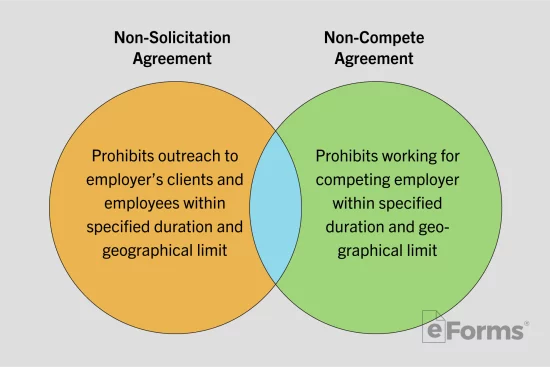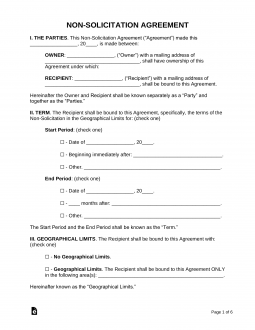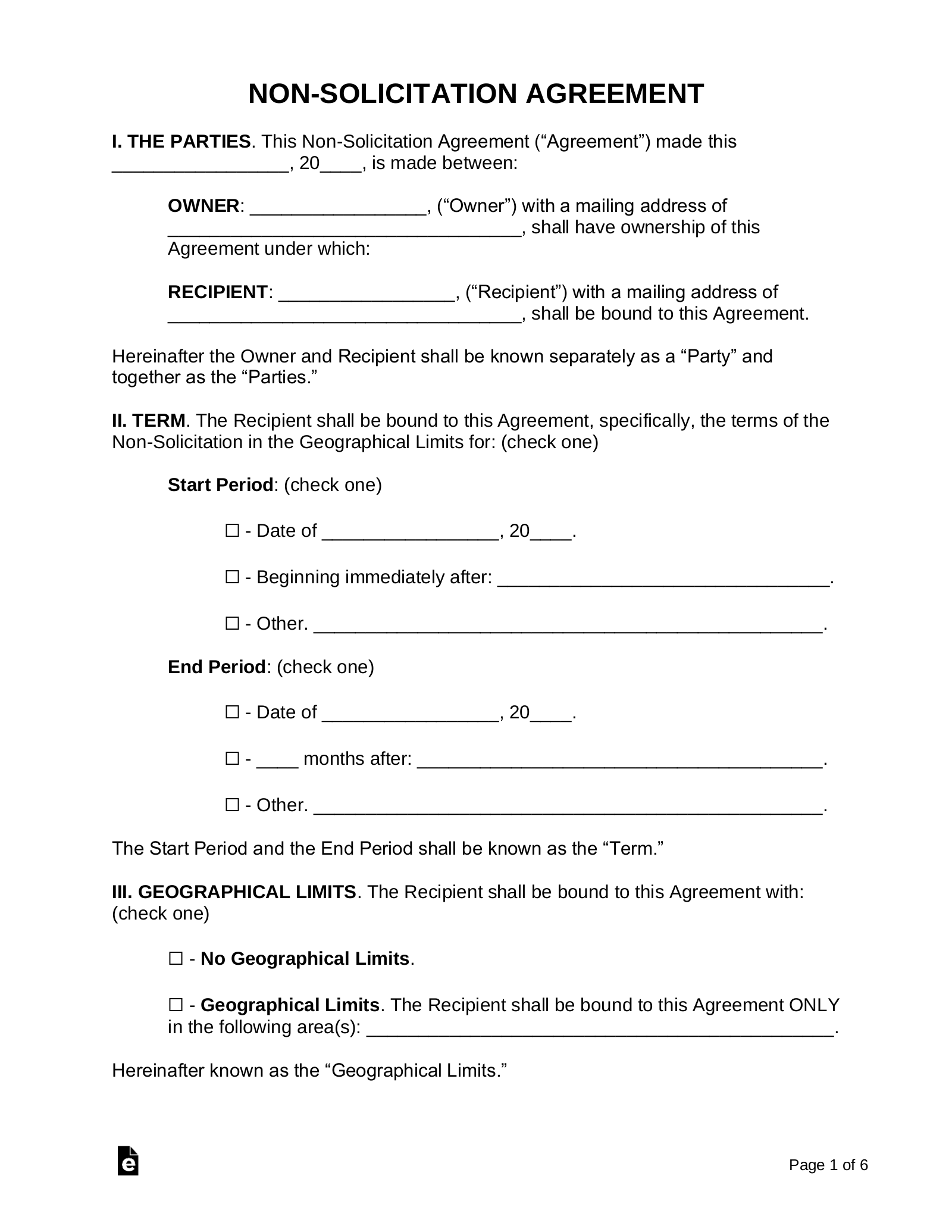For the comprehensive document, please download the free form or click the “Create Document” button.
Updated February 01, 2024
A non-solicitation agreement is a legal contract that prohibits an employee or another party from soliciting a business’s clients or employees for their own benefit. Typically signed at the beginning of employment or as part of a severance package, the non-solicitation agreement is intended to protect a business’s most valuable assets from its competitors.
Purpose
To prohibit a former employee or independent contractor from recruiting or interfering with the employer’s:
- Clients
- Customers
- Employees
- Other existing business relationships (e.g. suppliers, contractors)
By State
- Alabama
- Alaska
- Arizona
- Arkansas
- California
- Colorado
- Connecticut
- Delaware
- Florida
- Georgia
- Hawaii
- Idaho
- Illinois
- Indiana
- Iowa
- Kansas
- Kentucky
- Louisiana
- Maine
- Maryland
- Massachusetts
- Michigan
- Minnesota
- Mississippi
- Missouri
- Montana
- Nebraska
- Nevada
- New Hampshire
- New Jersey
- New Mexico
- New York
- North Carolina
- North Dakota
- Ohio
- Oklahoma
- Oregon
- Pennsylvania
- Rhode Island
- South Carolina
- South Dakota
- Tennessee
- Texas
- Utah
- Vermont
- Virginia
- Washington
- Washington D.C.
- West Virginia
- Wisconsin
- Wyoming
Table of Contents |
What is a Non-Solicitation Agreement?

A non-solicitation agreement prohibits an individual from using a business’s customers and employees for their own benefit. It can be presented as a stand-alone document or as a clause in an all-encompassing employment contract, which may also include non-compete or non-disclosure clauses.
What Should Be Included in a Non-Solicitation Agreement?
While each state has its own laws and restrictions governing non-solicitation covenants, it is generally recommended to include the following parameters to ensure that the agreement stands up in a court of law.
1. Time Period
Each state may have its own laws on the maximum length of time that a non-solicitation agreement can be effective. Typically, a non-solicitation covenant ranges from six months to two years.
2. Geographical Area
This limits the terms of the non-solicitation agreement to apply to only a specific location. For example, if the company is based in Los Angeles, the restriction may only be applied to the Greater Los Angeles area.
3. Restricted Activity
The agreement must specify exactly what the individual is restricted from doing as part of the agreement. For instance, the restricted activity may include taking their active client list or contracting the company’s supplier after leaving the job.
What Happens If You Break a Non-Solicitation Agreement?
If a person breaks a non-solicitation agreement, the company may first issue a cease-and-desist to prevent them from continued violation of the agreement. Ultimately, the violating party can be sued and forced to pay for damages as well as legal fees.
Can You Get Around a Non-Solicitation Agreement?
Short answer: No.
Because a non-solicitation agreement is a legal document, it is considered legally binding once signed. The only exception is by obtaining a release from the employer.
In some cases, if specified in the covenant, the employer may allow the employee to purchase a release from the agreement.
Is a Non-Solicitation Clause Legally Enforceable?
A non-solicitation agreement is legally enforceable to a degree in most states.
Because each state governs non-solicitation based on its own statutes or case laws, it’s important to get familiar with the laws of the state where the company is based. For example, Arizona limits non-solicitation agreements to a maximum of three years, while Oregon restricts the terms to a maximum of 18 months from the date of termination.
In other words, each state decides what is considered “reasonable” — and therefore, enforceable.
Non-Solicitation vs. Non-Compete

A non-solicitation agreement specifically addresses the employee’s outreach to the employer’s clients, customers, and employees for their own benefit. While most courts require the restrictions in the covenant to be reasonable, a non-solicitation agreement is generally easier to enforce than a non-compete.
A non-compete agreement or clause prevents an employee from taking a job with a competing employer for a period of time in a specified geographical area after their employment has ended. Non-competes covenants tend to be much more restrictive than non-solicitation, and some states — including California, North Dakota, Oklahoma, and Washington D.C. — have banned them outright.
Non-Solicitation Laws: By State
| State | Legally Enforceable? | Limitations | Statutes / Cases |
| Alabama | Yes | Must be “preserving a protectable interest” | Section 8-1-190, Section 8-1-191 |
| Alaska | Yes | As long as it does not prohibit a person from practicing their specialty | Metcalfe Investments, Inc. v. Garrison (1996) |
| Arizona | Yes | Limit of 3 years and prohibited for licensed physicians | Amex Distributing Co. v. Mascari (1986), Valley Med. Specialists, 982 F.2d at 1283 (1999) |
| Arkansas | Yes | The agreement must protect a valid interest, avoid overly broad geographical restrictions, and have a reasonable time limit. | Moore v. Midwest Distribution, Inc., 65 S.W.3d 490, 493 (Ark. 2002). |
| California | Unclear | Past cases have allowed non-solicitation agreements, but recent cases have ruled them illegal. | Loral Corp. v. Moyes, 174 Cal. App.3d 268, 279 (Cal. Ct. App. 1985), AMN Healthcare, Inc. v. AYA Healthcare Servs., Inc., 28 Cal. App. 5th 923, 939 (Cal. Ct. App. 2018). |
| Colorado | Yes | The agreements may only prohibit former employees from soliciting current employees, not clients. | Phoenix v. Dowell, 176 P.3d 835, 844 (2008). |
| Connecticut | Yes | Agreements must be limited in time and scope, and balance the interest of employers, employees, and the public. | Scott v. General Iron and Welding Co., 368 A.2d 111, 114 (Conn. 1976), § 20-14p, § 31-50a, § 31-50b |
| Delaware | Yes | Agreements must be reasonable in scope and duration, advance a legitimate interest of the employer, and balance the interest of the employee and the public. | Tristate Courier and Carriage, Inc. v. Berryman, C.A. No. 20574-NC (Del. Ch. Apr. 15, 2004). |
| Florida | Yes | Limitations on time, reach and line of business must be reasonable. | § 542.335(1) |
| Georgia | Yes | Agreements must be reasonable in duration, geographic reach, and scope of activity. | W.R. Grace Co. v. Mouyal, 262 G.A. 464, 465 (Ga. 1992) |
| Hawaii | Yes, except for employees of technology businesses | Agreements must be reasonable. | § 480-4(d), Technicolor, Inc. v. Traeger, 57 Haw. 113, 122 (1976) |
| Idaho | Yes | Agreements must be reasonable. | Intermountain Eye and Laser Centers, P.L.L.C. v. Miller, 142 Idaho 218, 224 (2005) |
| Illinois | Yes | Agreements must be reasonable and necessary to protect a legitimate business interest. | Lawrence & Allen, Inc. v. Cambridge Human Resource Group, Inc., 292 Ill. App. 3d 131, 138 (Ill. App. Ct. 1997). |
| Indiana | Yes | Only enforceable if the agreement is reasonable with respect to the employer, the employee, and the public interest | Licocci v. Cardinal Associates, Inc., 445 N.E.2d 556, 561 (Ind. 1983). |
| Iowa | Yes | Enforceable if the agreement is reasonably necessary for the protection of the employer’s business, and not unreasonably restrictive of the employee’s rights nor prejudicial to the public interest | Iowa Glass Depot. Inc. v. Jindrich, 338 N.W.2d 376, 381 (Iowa 1983). |
| Kansas | Yes | Enforceable if reasonable and offered as part of a valid contract | Weber v. Tillman, 259 Kan. 457, 463-64 (Kan. 1996) |
| Kentucky | Yes | Agreements must be only so restrictive as to protect the employer’s interest, and not harm the public interest or impose an undue hardship on the employee. | Central Adjustment Bureau, Inc. v. Ingram Associates, Inc., 622 S.W.2d 681, 685 (Ky. Ct. App. 1981). |
| Louisiana | Yes | Agreements cannot last more than two years and do not apply to licensed car sellers. | § 23:921(C), § 23:921(I) |
| Maine | Yes | Enforceable only if reasonable and no broader than necessary to protect the interest of the employer | Chapman Drake v. Harrington, 545 A.2d 645, 647 (Me. 1988) |
| Maryland | Yes | Enforceable if it satisfies the following requirements: The employer must have a legally protected interest; it must be reasonable in scope and duration; it cannot impose an undue hardship on the employee; it cannot violate public policy | Aerotek Inc. v. Obercian, 377 F.Supp.3d 539 (D. Md. 2019) |
| Massachusetts | Yes | Prohibited for broadcast employees, nurses, physicians, social workers, student interns, employees under the age of 18, and employees laid off or terminated without cause | Mass. Gen. L. ch. 112, § 12X |
| Michigan | Yes | Agreements must be reasonable | §445.774a |
| Minnesota | Yes | Only if the agreement can be clearly proven necessary to protect business interests | Bennett, supra, 134 N.W.2d 892, 899-900 |
| Mississippi | Yes | Only if an employee was terminated voluntarily or with cause | Empiregas, Inc. v. Bain, 599 So.2d 971 (Miss. 1992), Redd Pest Control Co. v. Foster, 761 So.2d 967 (Miss. Ct. App. 2000) |
| Missouri | Yes | Maximum one-year duration, and prohibited for clerical and secretarial employees | Mo. Rev. Stat. § 431.202 |
| Montana | Yes | Only between business entities and partners; prohibited against employees | Mont. Code Ann. § 28-2-703 |
| Nebraska | Yes | As long as the restrictions are not harmful to the employee or the public. Terms must not be more severe than is absolutely necessary for the sake of protecting business interests. | Securities Acceptance Corp. v. Brown, 106 N.W.2d 456, 463-464 (Neb. 1960) |
| Nevada | Yes | The former employee will not disclose business methods, confidential information, customer lists, secret formulas or processes, or trade secrets. | § 613.200(4) |
| New Hampshire | Yes | Agreements must be reasonable and should not be more expansive than necessary to protect the legitimate business interests of employers. | Technical Aid Corp. v. Allen, 134 N.H. 1, 11 (N.H. 1991) |
| New Jersey | Yes | Only if the restrictions it sets reasonably protect the business’s legitimate interests, are not damaging to the public interest, and don’t force any improper difficulties on an employee | Solari (Industries, Inc. v. Malady), 55 N.J. 571, 264 A.2d 53 (N.J. 1970) |
| New Mexico | Yes | Only if the agreement is not executed with the intention of suppressing competition | Nichols v. Anderson, 92 P.2d 781, 783 (1939) |
| New York | Yes | Only if they are needed to prevent the use or disclosure of a company’s confidential information | Purchasing Assocs., Inc. v. Weitz, 196 N.E.2d 245, 247-48, 245 (N.Y. 1963) |
| North Carolina | Yes | An employee’s right to earn a living must take precedence over the employer’s business interests.
Time and geographical limitations must be deemed reasonable; terms must not violate public policy; agreement must be signed. |
United Labs. Inc. v. Kuykendall, 370 S.E.2d 375 (N.C. 1988)
Precision Walls, Inc. v. Servie, 568 S.E.2d 267 (N.C. App. 2002) |
| North Dakota | Yes | Agreements have been held to be enforceable where they would limit a former employee’s ability to solicit former co-workers to leave the employer. | Warner and Company v. Solberg, 634 N.W.2d 65, 73 (N.D. 2001)). |
| Ohio | Yes | Agreements must not contain too many limitations related to time and space. | Raimonde v. Van Vlerah (1975) |
| Oklahoma | Yes | Agreements can be written or verbal, can prohibit employees from soliciting established customers, employees, or contractors associated with their employer. | Okla. Stat. tit. 15, § 219A, Okla. Stat. tit. 15, § 219B |
| Oregon | Yes | The term of an agreement may not exceed 18 months from the date of the employee’s termination and is limited to a geographic area and specified activities. | Oregon ORS Tit. 51, 653.295 |
| Pennsylvania | Yes, with limitations | Courts balance employer’s business interest, employee’s interest in earning a living, and interest of the public before deciding on enforceability. | Hess v. Gebhard & Co., Inc. (2002), Pittsburg Logistics Sys. Inc. v. Beemac Trucking LLC (2021), WellSpan Health v. Bayliss (2005) |
| Rhode Island | Yes, with limitations (except for physicians) | Agreements can be enforced if the limitations on both time and geographic space are considered reasonable and do not adversely affect the public interest. Physicians are exempt. | Durapin, Inc. v. American Products, Inc. (1989), RI Gen L § 5-37-33 (2017) |
| South Carolina | Yes, with limitations | Agreements have to contain reasonable provisions relating to the timeframe and geographic scope by which an employee is restricted from soliciting a company’s business after terminating employment with that company. | Sermons v. Caine Estes Ins. Agency (1980), Rental Uniform Service of Florence, Inc. v. Dudley (1983) |
| South Dakota | Yes | Must be limited in geographic scope, cannot cover a period exceeding two years | S. D. Codified Laws Ann. §53-9-9, §53-9-10, §53-9-11 |
| Tennessee | Yes | Courts determine reasonableness based on potential impacts to the employer, employee, and public interest. Agreements signed by healthcare providers must be limited in geographic scope and cannot cover a period exceeding two years. | Vantage Technology, LLC v. Cross (1999), Tennessee Code Title 63. Professions of the Healing Arts § 63-1-148 |
| Texas | Yes | Must contain limitations as to time, geographical area, and scope of activity to be restrained. Agreements restricting solicitation by physicians must not deny access to former patients and their medical records. | Bus. & Com. Code Title 2 Chapter 15 Section 15.50 |
| Utah | Yes, within limits | Enforceable agreements must be negotiated in good faith, necessary to protect the legitimate interests of the employer, and reasonably limited in timeframe and geographic area. | Utah Code § 34-51-201, TruGreen Cos., L.L.C. v. Mower Brothers (2008), Allen v. Rose Park Pharmacy (1951) |
| Vermont | Yes | Agreements must pass the test of reasonableness, which means they are not contrary to public policy, are necessary for the protection of the employer, and do not unnecessarily restrict the employee’s rights. | Roy’s Orthopedic, Inc. v. Lavigne (1982), Vermont Elec. Supply Co. v. Andrus (1974) |
| Virginia | Yes | Agreements are enforceable if they are designed specifically to safeguard the employer’s legitimate business interests, but not if they unreasonably restrict a person’s ability to earn a living or violate public policy. | Omniplex World Servs. Corp. v. US Investigations Servs. (2005), Edward D. Jones & Co. LP v. Clyburn (2020) |
| Washington | Yes | Must not unreasonably restrict an employee for too long or in too large an area | Knight, Vale & Gregory v. McDaniel (1984) |
| Washington D.C. | Yes | District bans non-compete agreements generally, but non-solicitation agreements determined reasonable, which do not violate public policy or unreasonably restrain trade, are enforceable. | D.C. Law 23-209. Ban on Non-Compete Agreements Amendment Act of 2020 |
| West Virginia | Yes | Must be reasonable in terms of timeframe and geographic area. Contracts signed by physicians are limited to one year and 30 miles | Reddy v. Community Health Found. of Man (1982), Physicians Freedom of Practice Act §47-11E-1 to 11E-5 |
| Wisconsin | Yes | Must be reasonable and necessary for the protection of the employer’s business | Wis. Stat. Ann. §103.465, Star Direct, Inc. v. Eugene Dal Pra (2009) |
| Wyoming | Yes | Must protect the legitimate interests of the employer and be reasonable in duration and geographical limitations | Hopper v. All Pet Animal Clinic, Inc. (1993) |
Sample Clause
Add the following clause to any employment contract:
Non-Solicitation. During the term of this agreement, and for ____ years afterward, the employee shall not interfere on the employer’s relationships with current and former customers, clients, business associates, employees, contractors, and any other entity with a direct or indirect affiliation with the employer.
Sample Non-Solicitation Agreement
Download: PDF, MS Word, OpenDocument
NON-SOLICITATION AGREEMENT
I. THE PARTIES. This Non-Solicitation Agreement (“Agreement”) made this [DATE], is made between:
OWNER: [NAME] (“Owner”) with a mailing address of [MAILING ADDRESS], shall have ownership of this Agreement under which:
RECIPIENT: [NAME] (“Recipient”) with a mailing address of [MAILING ADDRESS] shall be bound to this Agreement.
Hereinafter the Owner and Recipient shall be known separately as a “Party” and together as the “Parties.”
II. TERM. The Recipient shall be bound to this Agreement, specifically, the terms of the Non-Solicitation in the Geographical Limits for: (check one)
Start Period: (check one)
☐ – Date of [DATE]
☐ – Beginning immediately after: [EVENT]
☐ – Other. [OTHER]
End Period: (check one)
☐ – Date of [DATE]
☐ – [#] months after: [EVENT]
☐ – Other. [OTHER]
The Start Period and the End Period shall be known as the “Term.”
III. GEOGRAPHICAL LIMITS. The Recipient shall be bound to this Agreement with: (check one)
☐ – No Geographical Limits.
☐ – Geographical Limits. The Recipient shall be bound to this Agreement ONLY in the following area(s): [GEOGRAPHICAL LIMITS].
Hereinafter known as the “Geographical Limits.”
IV. NON-SOLICITATION. The Owner shall possess, in accordance with the terms of this Agreement, the following protections: (check all that apply)
☐ – Employees. The Recipient shall not be allowed to associate themselves with the Owner: (check one)
☐ – All Employees. The Recipient shall be prohibited from engaging with any former or current employees, contractors, affiliates, and similar parties of the Owner under which a business relationship has been created.
☐ – Specific Employees. The Recipient shall be prohibited from engaging with the following employees and contractors of the Owner: [SPECIFIC EMPLOYEES]
☐ – Customers. The Recipient shall not be allowed to associate themselves with the Owner: (check one)
☐ – All Customers. The Recipient shall be prohibited from engaging with any former or current customers, clients, and similar parties of the Owner under which a business relationship has been created.
☐ – Specific Customers. The Recipient shall be prohibited from engaging with the following customers and clients of the Owner: [SPECIFIC CUSTOMERS]
Hereinafter known as the “Non-Solicitation.”
VII. PURCHASE OF RELEASE. The Parties agree that the Recipient: (check one)
☐ – Cannot Purchase a Release. The Recipient has no option, during the Term or any period thereafter, to purchase the rights of this Agreement from the Owner for the purposes of waiving any liability or releasing themselves under this Agreement.
☐ – Can Purchase a Release. The Recipient has the option, during the Term or any period thereafter, to purchase and waive all liability under this Agreement for the sum of [AMOUNT] US Dollars [#] as payment to the Owner.
IX. GOVERNING LAW. This Agreement shall be governed by and construed in accordance with the laws of the State of [STATE] without reference to its conflicts of laws principles. Any disputes arising from or related to the subject matter of this Agreement shall be heard in a court of appropriate jurisdiction of the Owner’s principal office, and the Parties hereby consent to the jurisdiction and venue of these courts.
a.) Severability. If any provisions of this Agreement or its applications are held to be invalid, illegal, or unenforceable in any respect, the validity, legality, or enforceability of any other provisions and applications herein shall not in any way be affected or impaired.
b.) Remedies. Should the Recipient breach any of the provisions of this Agreement, the Recipient agrees to reimburse the Owner for any loss or expenses incurred by the Owner as a result of any prohibited use or activity under this Agreement, including, without limitation, court costs and reasonable attorney’s fees incurred by the Owner in enforcing the provisions hereof.
X. ADDITIONAL TERMS. [ADDITIONAL TERMS & CONDITIONS]
XI. ENTIRE AGREEMENT. This Agreement represents the entire agreement between the Parties and may only be modified by the signature of both Parties hereto.
Recipient Signature: _____________________________
Print Name: [RECIPIENT’S FULL NAME]
Date: [DATE]
Owner Signature: _____________________________
Print Name: [OWNER’S FULL NAME]
Date: [DATE]


